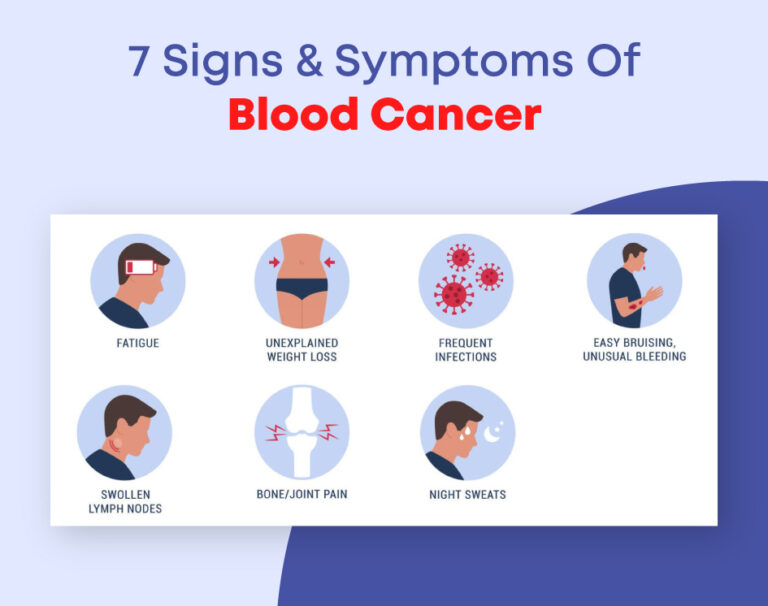
7 Signs & Symptoms Of Blood Cancer
Are you experiencing unexplained fatigue, frequent infections, or unusual bleeding? These symptoms could be potential indicators of blood cancer. Blood cancer, also known as hematologic cancer, affects the production and function of blood cells in the body.
Early detection is vital for successful treatment, making it more important to be aware of the signs and symptoms. In this article, we will explore the key indicators of blood cancer that you should never ignore.
From persistent fatigue and unexplained weight loss to night sweats and bone pain, blood cancer can manifest in various ways. It is essential to recognize these symptoms and seek medical attention to ensure timely diagnosis and appropriate treatment. Understanding the signs can help you and your loved ones take proactive steps towards early detection and effective management of blood cancer.
Types of Blood Cancer
Blood cancer is a broad term that encompasses several types of cancers that affect the blood, bone marrow, and lymphatic system. Leukemia, lymphoma, and myeloma are among the most prevalent types of blood cancer. Each type has its own unique characteristics and may present different signs and symptoms. It is important to have a basic understanding of these types to better recognize potential warning signs.
Leukemia
Leukemia is a type of blood cancer that affects the bone marrow and blood. It is characterized by the rapid production of abnormal white blood cells, which replace healthy blood cells. Leukemia encompasses four main types: acute lymphoblastic leukemia (ALL), acute myeloid leukemia (AML), chronic lymphocytic leukemia (CLL), and chronic myeloid leukemia (CML). Each type has distinct characteristics and can manifest with different signs and symptoms.
Lymphoma
Lymphoma is a type of blood cancer that affects the lymphatic system, which is responsible for fighting infection and disease. Lymphoma has two primary types: Hodgkin lymphoma and non-Hodgkin lymphoma. Hodgkin lymphoma is characterized by the presence of Reed-Sternberg cells (abnormal white cells), while non-Hodgkin lymphoma includes a diverse group of lymphomas. Both types can cause similar symptoms, such as swollen lymph nodes, fever, and weight loss.
Myeloma
Myeloma, also known as multiple myeloma, is a type of blood cancer that affects plasma cells, which are responsible for producing antibodies. In myeloma, abnormal plasma cells accumulate in the bone marrow and interfere with the production of normal blood cells. Symptoms may include bone pain, fatigue, and frequent infections.
Common Signs and Symptoms of Blood Cancer
1. Unexplained Weight Loss
Unexplained weight loss is a frequent symptom of blood cancer. If you’re losing weight without altering your diet or exercise habits, it might be worrisome. Weight loss linked to blood cancer is typically rapid and unexplained, even if your appetite and eating patterns stay the same. This can be due to the body’s heightened metabolic needs as cancer cells proliferate.
2. Persistent Fatigue and Weakness
Persistent tiredness and weakness are frequently initial indicators of blood cancer. If you experience ongoing fatigue and lack of energy despite sufficient rest, it might be a warning sign. Blood cancer impacts the production of healthy blood cells, causing a reduction in oxygen-carrying red blood cells. This can lead to fatigue and weakness due to insufficient oxygen supply to the body.
3. Frequent Infections and Slow Healing
Blood cancer can weaken the immune system, making individuals more susceptible to infections. If you find yourself frequently falling ill or experiencing prolonged recovery periods from common infections, it may be a sign of blood cancer. The cancer cells can interfere with the normal function of white blood cells, which play a crucial role in fighting off infections and promoting healing.
4. Easy Bruising and Bleeding
Blood cancer can disrupt the normal clotting process, leading to easy bruising and bleeding. If you notice an increase in bruises without any apparent cause or experience prolonged bleeding from minor cuts or injuries, it could be a symptom of blood cancer. The cancer cells can affect the production of platelets, which are responsible for clotting blood and preventing excessive bleeding.
5. Enlarged Lymph Nodes and Swollen Abdomen
Enlarged lymph nodes and a swollen abdomen can be signs of blood cancer, particularly lymphoma. Lymph nodes are an important part of the immune system and are located throughout the body. Blood cancer can cause the lymph nodes to swell as cancer cells accumulate in these areas. Swelling in the abdomen can also occur if cancer cells accumulate in the spleen or liver.
6. Bone Pain and Joint Pain
Bone pain and joint pain can be symptoms of blood cancer, especially in the case of myeloma. Cancer cells can accumulate in the bone marrow, leading to bone pain and fractures. Joint pain can also occur as a result of inflammation caused by cancer cells. If you experience persistent bone pain or joint pain without any obvious cause, it is important to get it checked out by a medical professional.
7. Night sweats
Night sweats, or nocturnal hyperhidrosis, are excessive sweating episodes that occur during sleep. In the context of blood cancer, night sweats can be a symptom of lymphoma, a type of blood cancer affecting the lymphatic system. These night sweats are typically severe and occur regardless of the normal temperature. If you experience frequent or severe night sweats, it’s important to consult a healthcare professional for proper evaluation and diagnosis.
Remember, early diagnosis and appropriate treatment can significantly improve outcomes for individuals with blood cancer.
Conclusion
Blood cancer can present itself in various ways, and the signs and symptoms discussed in this article should not be ignored. Early detection plays a crucial role in effectively managing blood cancer and improving treatment outcomes. If you are experiencing any of the mentioned symptoms or have concerns about your health, it is important to consult with a healthcare professional. Regular check-ups, staying informed, and maintaining a healthy lifestyle can contribute to early detection and better overall health.






